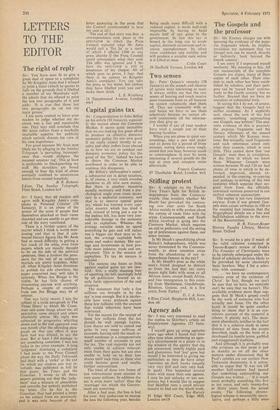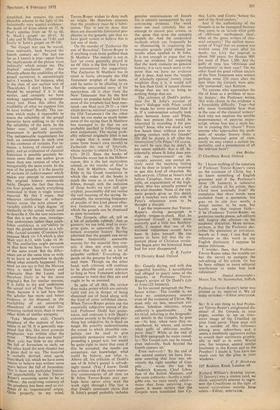Trevor-Roper's review of Dodd's The Founder of Christianity were to
be entirely submerged under the flood of scholarly derision likely to be provoked by some alarmingly basic howlers. May I list a selec- tion, with comment: ' . . . we have no contemporary sources even of the existence of Christ'. In fact, though we can't be sure that we have, we certainly can't be sure that we haven't. The available evidence more than sug- gests that St Mark's gospel could be the work of someone who had actually met Jesus. On the other hand, it would be quite another thing to claim that it is an eye- witness account of the material it relates. It plainly isn't, The docu- ment abundantly testifies to the fact that it is a relation made at some distance of time from the events described, made on the basis of a developed (in hostile terms, garbled and exaggerated) tradition.
And although it is probably true (the evidence on this point is just as sketchy as on all the other matters under discussion) that St Paul's epistles are our earliest New Testament documents, it is unten- able to argue that 'It was not till another half-century had passed that something approaching our Gospels was written ...' It is much more probably something like five to ten years, and only twenty-five to thirty years from the actual events. The following chrono- logical scheme is necessarily specu- lative, and perhaps a little over- simplified, but remains the most plausible scheme in the light of the (admittedly very scanty) evidence: the death of Jesus about AD 35, St Paul's epistles from AD 50 to 60, St Mark's gospel AD 60-65, St Luke and St Matthew AD 75.80, and finally St John's gospel AD 90-100.
'No Gospel text can be traced, even indirectly, back beyond the fourth century AD.' The fact (so far as 1 know) is true—apart from the implications of the phrase 'even indirectly' which escape me. The implied conclusion (that this directly affects the credibility of the gospel narrative) is astonishingly naive. I wonder, for instance, what is the date of our earliest text of Thucidydes. I don't know, but I should be surprised if it is any earlier, and certainly we have nothing approaching a contemp- orary text. Does this affect the .credibility of what we suppose him to have written? Hardly. The rea- sons which make it impossible to assess the reliability of the gospel narrative have nothing to do with the reliability of the texts. In the latter case, valid and accurate assessment is perfectly possible. The indispensable requirement for such an assessment in each case is the existence of variants. For in- stance, a history of classical anti- quity, and an evaluation of classical historians is possible precisely be- cause more than one author gives more than one version of what is recognisably the same event. In the case of the gospels, it is the paucity of variants of subject-matter which makes any attempt to reconstruct the original history necessarily futile. Despite the fact that there are four gospels, nearly everything contained in them is single source material. By this I mean, that wherever similarities of subject- matter occur, the texts almost in- variably exhibit a high degree of similarity in the actual words used to describe it. On the rare occasions that this is not the case, investiga- tion undermines rather than estab- lishes confidence in our•ability to treat the gospel narrative as a reli- able, factual account. (Compare for instance Mark xiv 3-9, which is also Matt xxvi 6-13, with Luke vii 36- 50. The similarities might persuade us that here we have two variants of the same event. But the differ- ences are at the same time so wide as to leave us powerless to decide about what actually happened. The most we can say is that the Marcan story is much less literary and schematic than the Lucan, and therefore likely to be the more original.) But for similar reasons, it is futile to try and undermine the -actual text of the New Testa- Ment, because it is just here that the scholar has more and better evidence at his disposal, in the availability of an astonishing abundance of ancient and illu- minating variant texts, than in most other fields of similar antiquity.
'Take Matthew xxiii, Christ's Prophecy of the capture of Jeru- salem in AD 70. It is generally sup- Posed that this, like most accurate prophecies, was written after the event . ' Where does one begin? Matt. xxiii has little to say about the fall of Jerusalem as such; on the other hand the next chapter has !I great deal to say. The material Is verbally derived, once again, from Mark xiii. which we have some reason to believe was written some Years before the fall of Jerusalem. Nor is there any particular histori- ,sea1 improbability in this. Trevor- Roper's reasoning seems to be as follows: the surprising accuracy of _I,oe prophecy has been used as evi- dence of its 'supernatural' origin. Quite properly, to my mind, Trevor:Roper wishes to deny such an origin. He therefore assumes that the prophecy must be a fabri- cation. This is not to deny that there are discernible fabricated pro- phecies in the gospels; just that we have good reason to believe this is not one of them.
On the murder of 'Zacharias the son of Barachias', Trevor-Roper is if anything even more garbled than St Matthew. The murder is not in fact 'an event generally placed in AD 68' (this is the first time I have ever encountered the suggestion). The Zacharias St Matthew has in mind is fairly obviously the Old Testament prophet of that name, and he seems to be alluding to an otherwise unrecorded story of his martyrdom. -(It is clear from the New Testament that by the first century AD popular belief held that most of the prophets had been mar- tyred—see Matt xxiii 29-31—a view which derives minimal support from the Old Testament.) On the other hand, we can make so much better sense of the saying than St Matthew has managed to do that we are probably justified in following our own conjectures. The saying prob- ably referred originally (this is not to argue that it must therefore come from Jesus's own mouth) to Zechariah the son of Jehoiada, whose murder is related in 2 Chron. xxiv. 20-22. Since the books of Chronicles occur last in the Hebrew canon, this is the last martyrdom related, as the murder of Abel is the first. St Matthew, reading the Bible in the Greek translation in which the order of the books is much the same as in our English Bibles, though with the inclusion of those books we now call apo- cryphal, presumably did not realise the real meaning of the saying. In- cidentally, the surprising frequency of puzzles of this kind places effec- tive limitations on the extent to which the gospels can be dismissed as pure inventions.
'The Gospels, after all, tell us a lot of palpable rubbish.' Just as gunners, we are told, tend to over- prize guns, so apparently do his- torians overprize history. Having admitted that the gospels can never become histbrically assessable sources for the material they con- tain, it does not even remotely follow that 'they tell us a lot of palpable rubbish.' Everything de- pends on the purpose for which we read them. Though on the other hand, such criticism will continue to be plausible and even relevant so long as New Testament scholars continue to insist that they can and ought to be so assessed.
In spite of all this, the review does make points which are entirely valid and are in danger of being dismissed out of hand along with the kind of error exhibited above. When Trevor-Roper points out the essentially subjective nature of the task Professor Dodd has under- taken, and contrasts it with Dodd's extreme anxiety to be thought any- thing but subjective, he is dead on target. He possibly underestimates the extent to which plausible con- jecture can be used to give genuinely persuasive results in ex- pounding a gospel text, but would be quite right to insist that even if this be accepted. the results are coniecture, not knowledge; what could be history, not what is. Above all, his criticism of Dodd's use of St John's gospel is refresh- ingly sound. (Yes, I know, Dodd has written one of the most impres- sive commentaries of all time on St John; Trevor-Roper may per- haps have never even read the work right through.) The fact is that Dodd's consistent claim that St John's gospel probably includes
genuine reminiscences of Jesus's life is entirely unsupported by any convincing evidence. The work does not read remotely like an attempt to record past events, in the sense that even the synoptic gospels do. And the conjectural methods which can frequently be so illuminatidg in examining the synoptic gospels yield almost no results when applied to St John. It is not enough to argue that we have no evidence for supposing that the work contains no genuine history; it is very much more to the point that we have no evidence that it does. And were the 'weight of scholarly opinion' twenty times weightier than it is, it would still be less than God; it cannot choose things that are not to bring to nothing things that are.
The criticism of Dodd's prefer- ence for St John's account of Jesus's dialogue with Pilate could be made far more pointed than it is. If a conversation actually took place between Jesus and Pilate, who was present that would be interested in recording it for pos- terity? Jesus, who was dead a very few hours later, without ever re- gaining contact with his friends? (Or did he dictate it all after the resurrection?) Or Pilate? Of course, we can't be sure that he didn't. It just seems unlikely, that is all. In- cidentally, where St John does pro- vide an 'improvement' on the synoptic account, one cannot en- tirely resist the sneaking feeling that he does so largely in response to just this kind of objection. He tells us(xviii. 15)that at Jesus's trial before Caiaphas, there was a dis- ciple, an acquaintance of the high- priest, who was actually present in the trial chamber. None of the syn- optic gospels gives us this detail, and it matches very oddly with St Peter's reluctance even to be thought a disciple.
I get the impression that Trevor- Roper's closing paragraph is slightly tongue-in-cheek. Had he expressed himself a little more earnestly and a little less flamboy- antly, I suspect that one of his warmest supporters would have been St John himself. He too seems to have felt that the im- portant phase of Christian revela- tion began after the historical Jesus had for ever disappeared.



































 Previous page
Previous page